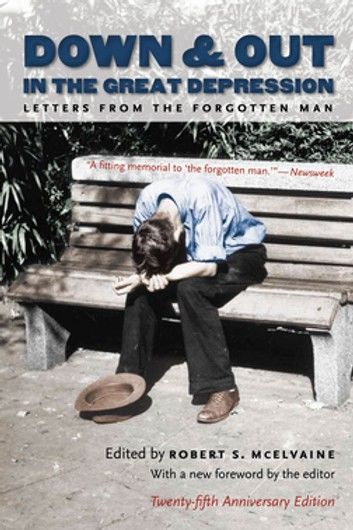| FindBook |
有 1 項符合
Down and Out in the Great Depression的圖書 |
 |
Down and Out in the Great Depression 出版社:The University of North Carolina Press 出版日期:2009-11-30 語言:英文 |
| 圖書館借閱 |
| 國家圖書館 | 全國圖書書目資訊網 | 國立公共資訊圖書館 | 電子書服務平台 | MetaCat 跨館整合查詢 |
| 臺北市立圖書館 | 新北市立圖書館 | 基隆市公共圖書館 | 桃園市立圖書館 | 新竹縣公共圖書館 |
| 苗栗縣立圖書館 | 臺中市立圖書館 | 彰化縣公共圖書館 | 南投縣文化局 | 雲林縣公共圖書館 |
| 嘉義縣圖書館 | 臺南市立圖書館 | 高雄市立圖書館 | 屏東縣公共圖書館 | 宜蘭縣公共圖書館 |
| 花蓮縣文化局 | 臺東縣文化處 |
|
|
Down and Out in the Great Depression is a moving, revealing collection of letters by the forgotten men, women, and children who suffered through one of the greatest periods of hardship in American history. Sifting through some 15,000 letters from government and private sources, Robert McElvaine has culled nearly 200 communications that best show the problems, thoughts, and emotions of ordinary people during this time.
Unlike views of Depression life "from the bottom up" that rely on recollections recorded several decades later, this book captures the daily anguish of people during the thirties. It puts the reader in direct contact with Depression victims, evoking a feeling of what it was like to live through this disaster.
Following Franklin D. Roosevelt's inauguration, both the number of letters received by the White House and the percentage of them coming from the poor were unprecedented. The average number of daily communications jumped to between 5,000 and 8,000, a trend that continued throughout the Rosevelt administration. The White House staff for answering such letters--most of which were directed to FDR, Eleanor Roosevelt, or Harry Hopkins--quickly grew from one person to fifty.
Mainly because of his radio talks, many felt they knew the president personally and could confide in him. They viewed the Roosevelts as parent figures, offering solace, help, and protection. Roosevelt himself valued the letters, perceiving them as a way to gauge public sentiment. The writers came from a number of different groups--middle-class people, blacks, rural residents, the elderly, and children. Their letters display emotional reactions to the Depression--despair, cynicism, and anger--and attitudes toward relief.
In his extensive introduction, McElvaine sets the stage for the letters, discussing their significance and some of the themes that emerge from them. By preserving their original spelling, syntax, grammar, and capitalization, he conveys their full flavor.
The Depression was far more than an economic collapse. It was the major personal event in the lives of tens of millions of Americans. McElvaine shows that, contrary to popular belief, many sufferers were not passive victims of history. Rather, he says, they were "also actors and, to an extent, playwrights, producers, and directors as well," taking an active role in trying to deal with their plight and solve their problems.
For this twenty-fifth anniversary edition, McElvaine provides a new foreword recounting the history of the book, its impact on the historiography of the Depression, and its continued importance today.
|









